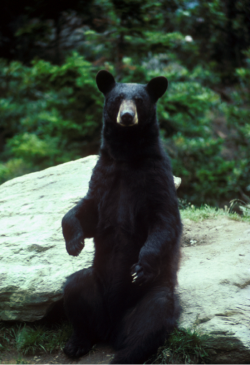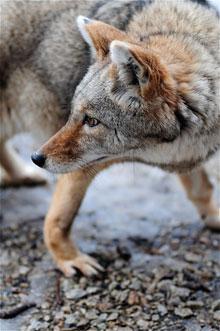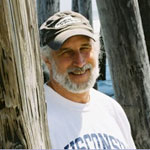TW Column by Steven Lewis
The Chilly, Enduring Odor of Bear
Early in March each year, I can smell it coming. Spring, that is. So I can also smell the bears turning in their caves.
Soon thereafter, I’ll be waking daily at sunrise and tiptoeing to the bedroom window to see if they have lumbered out after the long winter. I scan the park-like yard for emptied, mangled bird feeders. Garbage strewn around. Fence posts ripped from the garden.
 These bear “visits” are recent phenomena around this unintentional cage we call home. As near back as the last century, our big backyard seemed rather harmless and bucolic, with a swing set, tree house, and goldfish pond. Here in the shade of the Shawangunk Mountains, we heard and saw little more than crickets buzzing, birds chirping, wild turkeys gobbling, deer nibbling grass, and the occasional garter snake slithering under the upside-down wheelbarrow—a wholly benign landscape to laud over our friends in their big dangerous cities.
These bear “visits” are recent phenomena around this unintentional cage we call home. As near back as the last century, our big backyard seemed rather harmless and bucolic, with a swing set, tree house, and goldfish pond. Here in the shade of the Shawangunk Mountains, we heard and saw little more than crickets buzzing, birds chirping, wild turkeys gobbling, deer nibbling grass, and the occasional garter snake slithering under the upside-down wheelbarrow—a wholly benign landscape to laud over our friends in their big dangerous cities.
But somewhere around the turn of this century—perhaps as an omen of things to come in a world growing both tamer and wilder each day—the formerly timid deer seemed to gain courage and began eating our roses, which led, a season later and several yards closer to home, to our azaleas, and then to the yew bushes beside the front porch, stripped to ugly brown sticks poking through the white snow, me bursting through the unlocked door in socks and screaming bloody murder.
A year or two later, our buzzing summer nights became pierced by howling coyotes, fisher cats shrieking like little girls, that terrible-beyond-thinking yelp of bunnies caught in some carnivore’s incisors. Then the first bear, a beautiful 400-pound male, lumbered into our backyard as if he owned the place. And he was not alone.
In practical terms, I understand that bears are less of a threat to limb and life than the occasional rattler slithering down from the rocks. But for those esteemed readers whose connection to the wild world ends with the Discovery Channel, please know that a black bear standing seven feet tall, reaching for birdseed or berries, is a daunting, jaw-dropping sight. And, unlike snakes or deer, they don’t slither away or scamper for the tree line when you open the door…or when you bang pots and pans…or even when you stand as tall as the ranger tells you to stand, making your own territorial stand. Like the most arrogant of overgrown, muscularly arrogant inhabitants of your nightmares, they don’t even flinch. If you’re not food, you don’t exist. If you are, best stay inside.
 We now sometimes find ourselves trapped in our house, noses pressed to the windows, pondering the seismic shift that has occurred in the way we regard this home in the woods.
We now sometimes find ourselves trapped in our house, noses pressed to the windows, pondering the seismic shift that has occurred in the way we regard this home in the woods.
I am a teacher and a writer. So half of each day I work inside this civilized oasis of cinder blocks and wooden joists, double-paned glass and fiberglass insulation, sheetrock, and art on the walls—this gash of an intrusion into forest. For more than thirty years, I have made a living reflecting on the nature of life as a member of a small pack (we have seven kids) traveling through the various landscapes in which we seek sustenance.
To some degree, my work as a writer is to get myself back to the primitive wordless understanding of what it means to walk upon this earth—and then to use the tools of civilization to try to translate this understanding into narratives told in a pitch that humans can hear. If I don’t get back there into the forest, I know my work will be flat and uninteresting. Writers who write without an understanding of what lies beyond the intimate tree line might as well be writing Saturday to-do lists.
Which is precisely what I do the first Saturday after the bears return from their caves around Bonticou Crag. The list defines our to-dos not just for that Saturday but for the entire summer:
- bear proof the garbage bin—check
- erect a new fence around the garden—check
- reinforce the posts that hold the birdfeeders—check
- bring in the birdfeeders each night—check
- let the dogs out whenever the grandchildren are playing in the yard—check
- protect the goldfish in the small pond from becoming hors d’oeuvres—check
- hang the hot dogs and marshmallows from high branches when we camp out back near the stream—check
- lock the doors before we go to sleep each night—check and double check
Living in this narrow ecological DMZ, where the sounds of natural selection punctuate our nightly dreams, I am reminded each spring that this house is nothing more than a fallen tree, that the lawn is merely a clearing full of food and danger, that we share the gurgling stream with creatures who, after all these millennia, still don’t accept the notion of our dominion—that the weekend work I do to keep out the animals must be abandoned Monday mornings when I sit down at my computer and invite them back in.
Publication Information
- “The chilly, enduring odor of bear” is a quote from “The Bear” by Galway Kinnell.
Art Information
- “Black Bear” © Mike Bender; U.S. Fish and Wildlife Service, public domain
- “Coyote Scouting Around” © Daniel Vucsko; Creative Commons license
Steven Lewis is a longtime mentor at SUNY-Empire State College, a member of the Sarah Lawrence Writing Institute faculty, and an active freelance writer.
His work has been published in the Washington Post, Los Angeles Times, New York Times, Christian Science Monitor, AARP Magazine, Ladies Home Journal, and a biblically long list of parenting magazines. His books include Zen and the Art of Fatherhood (Dutton), The ABCs of Real Family Values (Plume), The Complete Guide for the Anxious Groom (Career Press), Fear and Loathing of Boca Raton: A Hippie's Guide to the Second Sixties (Quill Driver Books), and a recent collection of poems, A Month on a Barrier Island (Millrock Writers).
He is also turning the corner on a new novel and, newly intrigued by the possibilities of lulu.com, is packaging some novellas he originally wrote for his seven children to give to his fifteen (and counting) grandchildren.

